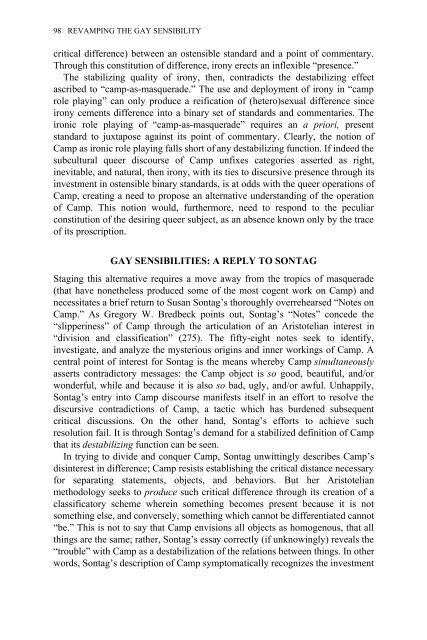Edited by Moe Meyer - Get a Free Blog
Edited by Moe Meyer - Get a Free Blog
Edited by Moe Meyer - Get a Free Blog
Create successful ePaper yourself
Turn your PDF publications into a flip-book with our unique Google optimized e-Paper software.
98 REVAMPING THE GAY SENSIBILITY<br />
critical difference) between an ostensible standard and a point of commentary.<br />
Through this constitution of difference, irony erects an inflexible “presence.”<br />
The stabilizing quality of irony, then, contradicts the destabilizing effect<br />
ascribed to “camp-as-masquerade.” The use and deployment of irony in “camp<br />
role playing” can only produce a reification of (hetero)sexual difference since<br />
irony cements difference into a binary set of standards and commentaries. The<br />
ironic role playing of “camp-as-masquerade” requires an a priori, present<br />
standard to juxtapose against its point of commentary. Clearly, the notion of<br />
Camp as ironic role playing falls short of any destabilizing function. If indeed the<br />
subcultural queer discourse of Camp unfixes categories asserted as right,<br />
inevitable, and natural, then irony, with its ties to discursive presence through its<br />
investment in ostensible binary standards, is at odds with the queer operations of<br />
Camp, creating a need to propose an alternative understanding of the operation<br />
of Camp. This notion would, furthermore, need to respond to the peculiar<br />
constitution of the desiring queer subject, as an absence known only <strong>by</strong> the trace<br />
of its proscription.<br />
GAY SENSIBILITIES: A REPLY TO SONTAG<br />
Staging this alternative requires a move away from the tropics of masquerade<br />
(that have nonetheless produced some of the most cogent work on Camp) and<br />
necessitates a brief return to Susan Sontag’s thoroughly overrehearsed “Notes on<br />
Camp.” As Gregory W. Bredbeck points out, Sontag’s “Notes” concede the<br />
“slipperiness” of Camp through the articulation of an Aristotelian interest in<br />
“division and classification” (275). The fifty-eight notes seek to identify,<br />
investigate, and analyze the mysterious origins and inner workings of Camp. A<br />
central point of interest for Sontag is the means where<strong>by</strong> Camp simultaneously<br />
asserts contradictory messages: the Camp object is so good, beautiful, and/or<br />
wonderful, while and because it is also so bad, ugly, and/or awful. Unhappily,<br />
Sontag’s entry into Camp discourse manifests itself in an effort to resolve the<br />
discursive contradictions of Camp, a tactic which has burdened subsequent<br />
critical discussions. On the other hand, Sontag’s efforts to achieve such<br />
resolution fail. It is through Sontag’s demand for a stabilized definition of Camp<br />
that its destabilizing function can be seen.<br />
In trying to divide and conquer Camp, Sontag unwittingly describes Camp’s<br />
disinterest in difference; Camp resists establishing the critical distance necessary<br />
for separating statements, objects, and behaviors. But her Aristotelian<br />
methodology seeks to produce such critical difference through its creation of a<br />
classificatory scheme wherein something becomes present because it is not<br />
something else, and conversely, something which cannot be differentiated cannot<br />
“be.” This is not to say that Camp envisions all objects as homogenous, that all<br />
things are the same; rather, Sontag’s essay correctly (if unknowingly) reveals the<br />
“trouble” with Camp as a destabilization of the relations between things. In other<br />
words, Sontag’s description of Camp symptomatically recognizes the investment


